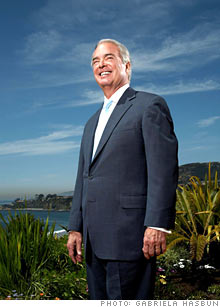How Duke Energy's CEO got started
After stints in journalism and law, Duke Energy's Jim Rogers found the role of CEO suited him.
 |
| Jim Rogers, CEO of Duke Energy |
(Fortune Magazine) -- My parents were programming me to be a doctor, but I ended up becoming a lawyer. I got married during college and worked at night as a newspaper reporter covering police and courts.
In a sense what led me to be a lawyer was my DNA -- my father was one -- and the work at the paper, which gave me an interest in the law.
Be open to following an unlikely path.
I [started out as a lawyer] with Akin Gump Strauss Hauer & Feld in their Washington office. In 1981 [D.C. powerhouse] Bob Strauss asked me to go interview for a job in the Reagan administration.
I was a seven-year associate and close to being partner. I was wondering, "Will this mean I won't make partner?" And then I thought, "I'm a Democrat. There's no way I can work in this administration."
But I ended up becoming, at age 34, the deputy general counsel in charge of all the litigation and enforcement. I had over 100 lawyers working for me. Now I laugh because it turned out to be the best thing that ever happened to me.
Get to know one industry.
I went back to the firm as partner 18 months later and helped start the U.S. Natural Gas Clearing House, which became Dynegy. Then I got picked by Ken Lay to run the gas pipeline business for Houston Natural Gas, later Enron.
Four years later I got a call from a headhunter who was looking for a CEO for Public Service Indiana (PSI), the largest electric utility in the state. They'd just written off a $2.7 billion investment in a failed nuclear plant.
We strengthened the balance sheet, then we proposed a merger with Cincinnati Gas & Electric. Another company launched a hostile takeover of PSI, which we fought off. We closed the deal, and I became the CEO of the new company, Cinergy.
In 2005 we announced the merger of Duke and Cinergy, and I became the CEO of Duke (DUK, Fortune 500). So [the job in government] put me on a trajectory and in a set of relationships that I don't think would ever have happened if I'd stayed at the firm. I might still be a partner in D.C. Instead I've been a CEO for 20 years.
• Keep on learning
I've told my people that they need to go learn something they haven't done before. I've been a journalist, a lawyer, a CEO. I didn't learn to ski until I was 36. I've learned to scuba dive and fly-fish. It's forced me to be an amateur and to learn to learn. It keeps you humble.
• Listen to your detractors
You need to listen to adversaries and understand where they are coming from. Then find a way to find common ground with them. After all these years of working with different groups, I've gotten comfortable with Mick Jagger's idea that you don't always get what you want, but you get what you need.
• Read voraciously
I think reading gives you new ways to think about old problems. I'm always sending books to my senior team, so I decided to buy them each a Kindle. When they're on the road, they can read books and download newspapers and magazines.
• Friend or foe
Despite being one of the largest emitters of carbon dioxide in the U.S., Duke Energy joined USCAP, an alliance of environmentalists and CEOs lobbying Congress for a cap-and-trade bill to fight global warming. "I had been told that you can't work with environmentalists," says Rogers, 61. "That was bad advice." ![]()
-
 The retail giant tops the Fortune 500 for the second year in a row. Who else made the list? More
The retail giant tops the Fortune 500 for the second year in a row. Who else made the list? More -
 This group of companies is all about social networking to connect with their customers. More
This group of companies is all about social networking to connect with their customers. More -
 The fight over the cholesterol medication is keeping a generic version from hitting the market. More
The fight over the cholesterol medication is keeping a generic version from hitting the market. More -
 Bin Laden may be dead, but the terrorist group he led doesn't need his money. More
Bin Laden may be dead, but the terrorist group he led doesn't need his money. More -
 U.S. real estate might be a mess, but in other parts of the world, home prices are jumping. More
U.S. real estate might be a mess, but in other parts of the world, home prices are jumping. More -
 Libya's output is a fraction of global production, but it's crucial to the nation's economy. More
Libya's output is a fraction of global production, but it's crucial to the nation's economy. More -
 Once rates start to rise, things could get ugly fast for our neighbors to the north. More
Once rates start to rise, things could get ugly fast for our neighbors to the north. More







